|
On 20 March 2013, the Permanent Missions of Japan and Brazil to the United Nations, together with the International Peace Institute (IPI), held an afternoon seminar at the Japan Society.
The seminar examined the evolving roles of military engineering units in U.N. peacekeeping operations. It highlighted their contribution to early peacebuilding efforts, in particular as part of the U.N. Stabilization Mission in Haiti (MINUSTAH) in the aftermath of the devastating January 2010 earthquake, as well as the U.N. Mission of Support in East Timor (UNMISET). It also highlighted specific challenges encountered when undertaking such new functions, as well as examples of noteworthy progress and provided some preliminary lessons for military engineering units in other U.N. peacekeeping operations around the world (the agenda of the event can be found here).
Around 100 leading experts on peacekeeping issues, including representatives from U.N. Member States and the U.N. Secretariat, joined the seminar. Such a high turnout and the lively discussion that ensued can be perhaps explained by the fact that the seminar featured one of the present topics on peacekeeping operations – the early peacebuilding role of multidimensional missions, looked at through the evolving role of engineering units, a very fresh and intriguing viewpoint.
The event began with opening remarks by Ambassador Maria Luiza Ribeiro Viotti of Brazil, Mr. Warren Hoge, Senior Advisor for External Relations at IPI and Ambassador Tsuneo Nishida of Japan (Ambassador Nishida’s remarks can be found here).
Deputy Secretary General Jan Eliasson, in his keynote speech, highlighted considerable benefits which the engineering units could provide to sustainable peace and development. He also emphasized the significance of early peacebuilding and necessity of a holistic and comprehensive approach to today’s multidimensional challenges, while pointing out that engineering units are able to provide an essential bridge between all dimensions, like peace, development and human rights.
The first panel, titled “New and Emerging Roles for Engineering Units: Peacebuilding and Other Support Opportunities,” examined experiences of engineering units in two missions in particular – UNMISET and MINUSTAH. A key conclusion of this panel was that the nature of military engineering units’ tasks in PKO has evolved and broadened. The panel also pointed out that engineering units have become one of the most visible elements of PKO. The panel clarified four basic benefits of PKO military engineering work: the essential engineering support to enable the existence of the mission; the socio-economic benefits to the local community of roads and bridges ; the goodwill and trust enhanced between the mission and the local population through “hearts and minds” engineering works; and the engineering support to U.N. agencies and NGOs and the host government in their work to address the root causes of conflict in the country.
The second panel discussed lessons and challenges, including coordination between the engineering units and the other mission components, partnership with other actors including U.N. Country Teams, NGOs and the host government, progressive adaption to requirements and challenges on the ground and prioritization of engineering projects. The panel highlighted the rule of supporting the peacebuilding process of a country is to complement and build capacities, rather than make substitutions for them and pointed out PKO’s engineering projects should be ideally maintained with indigenous labor, expertise and technology, as it allows for sustainable benefits to the host country.
A more detailed summary of the seminar discussion can be found here, as well as the video of the seminar, which can be found here (Opeinig - First Panel / Second Panel - Ending).
|
| 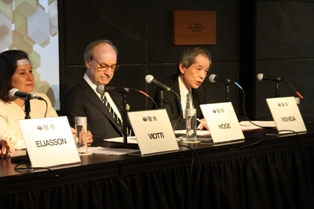
Ambassador Nishida gives opening remarks together with Ambassador Viotti of Brazil and Mr. Hoge from IPI
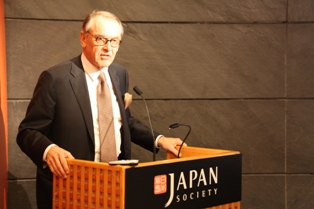
Deputy Secretary General Jan Eliasson gives the keynote speech
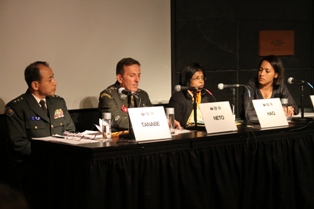
First Panel: From left, LG Tanabe from JSDF, LG Neto from Brazilian Armed Forces, USG Haq from UNDFS, and Ambassador Borges of Timor-Leste (Chair)
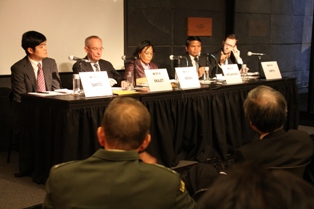
Second Panel: From left, Mr. Saito from PWJ, ASG Mulet from UNDPKO, Ambassador Ogwu of Nigeria PR (Chair), BG Witjaksono from the Indonesian National Armed Forces, and Mr. Smith from IPI
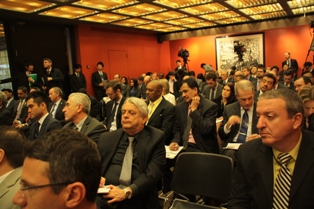
Around 100 leading PKO experts join the seminar discussion |

